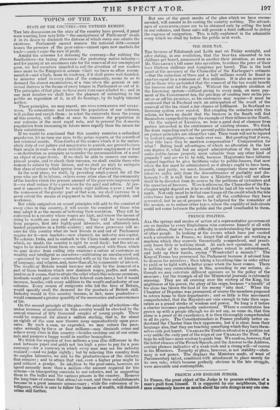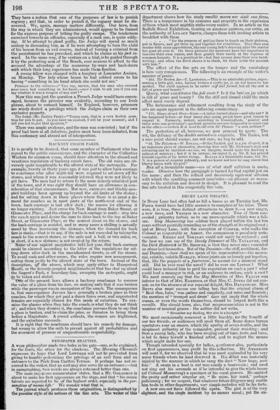FRENCH AND ENGLISH JUDGES.
IN France, the great object of the Judge is to procure evidence of a man's guilt from himself. It is supposed by our neighbours, that a man commonly knows as much about his own doings as any one else. They have a notion that one of the purposes of law is to punish roguery ; and that, in order to punish it, the roguery must be dis- covered. We, again, manage matters differently. Our laws, from the way in which they are administered, would appear to be framed for the express purpose of letting the guilty escape. The tenderness exercised towards an offender, especially if a rank one, is quite edify- ing. If he attempt to plead guilty, the Judge will spend as much oratory in dissuading him, as if he were attempting to turn the child of his bosom from an evil course, instead of turning a criminal from the punishment he has provoked, and which he claims as his jest re- ward. In the same way, if he venture on a trial, is he guided through it by the protecting arm of the Bench, ever anxious to afford to the excused the advantage of the numerous by-ways and back-doors with which their long experience has made them familiar. A young fellow was charged with a burglary at Lancaster Assizes, on Monday. The lady whose house he had robbed swore to his having "something in his hand which she could not see."
Prisoner to the witness—" You say, ma'am, that the man who entered your room had something in his hand ;—now I wish to ask you if you can say whether it was a weapon of any sort ? "
Now this was just the question a French Judge would have encou- raged, because the prisoner was evidently, according to our Irish phrase, about to commit himself. In England, however, prisoners are wisely denied a privilege which the Judges claim as their own exclusive property.
The Judge (Mr. Justice Park)—"Young man, that is a very foolish ques- tion for you to put. As you have no counsel, I will be your counsel ; and I tell you not to put that question."
There was ample evidence, and the man was convicted ; but if the proof had been at all defective, justice must have been defeated, from this customary and absurd act of interposition.



















 Previous page
Previous page